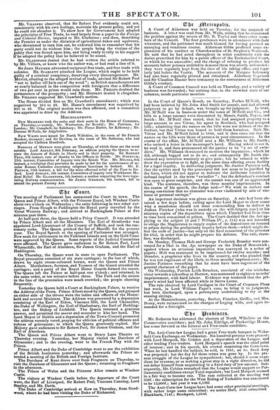Zbe _Metropolis.
A Court of Aldermen was held on Tuesday, for the despatch of business. A letter was read from Mr. Wells, stating that he abandoned the petition against the return of Mr. R. Taylor and three other mem- bers of the Council. The four gentlemen were in attendance with their witnesses, and the petitioner was much blamed for having pursued an annoying and vexatious course. Alderman Gibbs proffered some ex- planation of his conduct as Churchwarden of St. Stephen's Walbrook. He said that he had acted throughout in strict conformity with the duties prescribed for him by a public officer of the Ecclesiastical Court, to which he was amenable ; and the charge of refusing to produce his accounts before persons entitled:to demand them was utterly unfounded : they were regularly kept from the time of his taking office, and regu- larly laid before the Vestry. The accounts of the Margate Infirmary had also been regularly printed and circulated. Alderman Copeland and Sir Claudius Hunter bore testimony to the correctness of Alderman Gibbs's conduct.
A Court of Common Council was held on Thursday, and a variety of business was forwarded ; but nothing that, in the crowded state of our columns, needs particular mention.
In the Court of Queen's Bench, on Saturday, Forbes MNeill, who had been indicted by Mr. John Abel Smith for assault, and had allowed judgment to go by default, was brought up for judgment. In 1840, Mr. M`Neill was in business under the name of MNeill and Co., and bills to a large amount were discounted by Messrs. Smith, Payne, and Smith : Mr. MNeill then stated, that he had assigned property to a large amount to one Virtue, his agent in Scotland, who had accepted bills ; admitting that the names on the bills were not debtors of the de- fendant, but that Virtue was bound to hold them harmless. Both Mr. Virtue and Mr. MNeill failed in 1840, and it then came out that the names on the bills were those of persons in poor circumstances. In the course of the affair, Mr. ArNeill sent a Mr. Williams to Mr. Smith ; who noticed a letter in the messenger's hand. Having asked to see it, he read it, and then pronounced all the parties to be "a set of swin- dlers." Mr. Williams threatened to mention the imputation ; which he did, although begged not to do so ; and subsequently Mr. Smith dis- claimed any intention wantonly to give pain ; but he refused to with- draw the expression or to fight, at the same time offering every facility for a legal inquiry. In delivering judgment, Mr. Justice Patteson said, that the epithet used by the prosecutor did not seem to be justified by the facts, which did not appear to indicate the deliberate intention to defraud implied in the term "swindler "; but the defendant's conduct was open to great suspicion, and the assault was one of an aggravated kind. The sentence, therefore, was three months' imprisonment. In the course of his speech, the Judge said—" We wish to declare our strong conviction that no character was ever vindicated by acts of vio- lence or personal outrage."
An important decision was given on Saturday. A rule had been ob- tained a few days before, calling upon the Lord Mayor to show cause why a mandamus should not issue commanding him to deliver to Joshua Fletcher (who was in custody on the will-forgery case) or his attorney copies of the depositions upon which Fletcher had from time to time been committed to prison. The Court decided that the Act ap- plying to the subject (6 and 7 William IV., c. 114) was not intended to oblige the Magistrates to supply copies of the depositions on remand to prison during the preliminary inquiry before them—which might de- feat the ends of justice—but only on the final committal of the prisoner for trial, in order that he might prepare his defence. The rule, there- fore, was discharged. On Monday, Thomas Holt and George Frederick Brander were sen- tenced for a libel in the Age newspaper on the Duke of Brunswick ; against whom an atrocious imputation was conveyed in a series of papers : Holt was sentenced to be imprisoned for twelve months ; and Brander, a proprietor who lives in the country, and who pleaded that he was not cognizant of the libels, to three months' imprisonment • Mr. Justice Patteson remarking that he must have been cognizant of the general character of the paper.
On Wednesday, Patrick Leith Strachan, convicted of vile misbeha- viour towards a schoolboy at Harrow, was sentenced to eighteen months' imprisonment, with hard labour. Evidence was tendered that the pri- soner's mind had been affected while in Sierra Leone.
The rule obtained by Lord Cardigan in the Court of Common Pleas last week, in Lord William Paget's case, to bring it to judgment, has been discharged, upon a peremptory undertaking to try at the ensuing sittings.
At the Mansionhouse, yesterday, Barber, Fletcher, Griffin, and Mrs. Dorey, were reexamined on the charges of forging wills, and again re- manded for a fortnight.


























 Previous page
Previous page